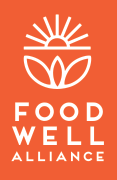Food Well Alliance releases white paper with strategies to increase compost production
/New Report: Food Well Alliance collaborates with local food stakeholders to identify strategic solutions to increase sustainable compost production for Atlanta’s urban growers
While the demand for high-quality, locally produced compost is on the rise in Metro Atlanta, regulatory uncertainty and food waste contamination are among key factors hindering the growth of Georgia’s compost industry.
A white paper released today by Food Well Alliance outlines these challenges and offers strategic recommendations formulated by a coalition of compost experts, educators, regulators and urban growers to reuse food waste to increase community-based composting in Metro Atlanta.
Together, these local food stakeholders - including the U.S. Environmental Protection Agency, Region 4; City of Atlanta, Office of Sustainability; Georgia Recycling Coalition; Georgia Restaurant Association; Truly Living Well Center for Urban Agriculture; and Compostwheels - have expanded on Food Well Alliance’s work to build healthy soil by increasing community-based composting capacity for urban farms and community gardens.
According to the white paper titled, Closing the Loop: Food Waste in Atlanta:
- Locally produced compost demand is strong and growing, but compost producers are unable to meet demand.
- Georgia’s compost industry needs the right regulatory climate so urban growers can grow more sustainably-grown, locally-produced food.
- Feedstock contamination is a safety issue and economic issue.
- The social enterprise model is an attractive solution to increase community-based composting.
Food Well Alliance believes community-based composting has the ability to effectively manage food waste and create healthier soil for Atlanta’s urban growers. With close to 40% of the landfills in Metro Atlanta filled with wasted food, the wasted food could be diverted as feedstock in the production of community-based compost and used locally by urban growers to produce more local food.
For more information and to download your copy of the white paper visit www.foodwellalliance.org/compostwhitepaper.




